The Stakeholder Advisory Committee for the N. Williams Traffic Operations Safety Project met today and came to a decision about how to reconfigure the street to improve bike access. I’m in Washington D.C. attending the National Bike Summit, but thanks to Twitter and to phone conversations with people at the meeting, I can share some info about what was decided on.
According to committee member Steve Bozzone, they went with option “4B: Left-Side Buffered Bike Lane with One Motor Vehicle Travel Lane and Turn Lanes (Segments 2 to 5) and Shared Left-Turn Lane/Bikeway in Segment 4” (see below).
In other words, the committee realized that a left side solution was needed, but that a parking-separated cycle track — which was proposed by PBOT as the best solution — wasn’t what everyone felt comfortable with. The “mix zone” in Segment 4 is a compromise with those concerned that congestion in this stretch (near N Failing) would be too severe if autos were not allowed access to a second lane. The street will have two lanes accessible for autos only in the stretch from N. Fremont to Skidmore, but it will be a shared environment with sharrow markings and curbs at the start of each block to deter through auto traffic.
According to one source at the meeting, the final vote and decision came in a flurry right at the end of today’s meeting and not everyone was on board (two committee members voted to leave the street the way it is), but a 2/3 consensus means the decision is final. Bozzone says the committee will meet one more time to iron out the details.
Here’s the PBOT drawing of option 4B (note: I wasn’t at the meeting, so I don’t know if they passed this as it is presented below or if alterations were made):

And the cross-section:
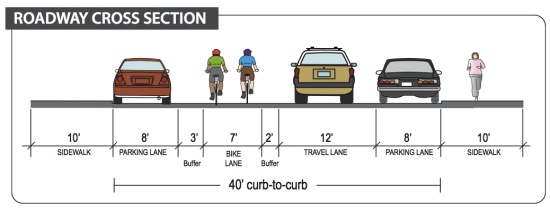
And here are two drawings that show what the mixed lane environment will look like
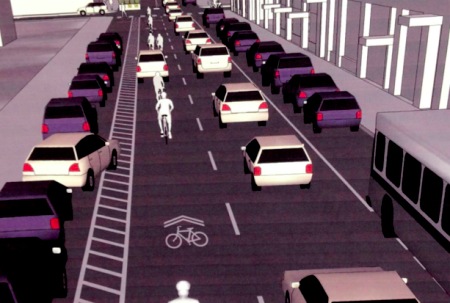
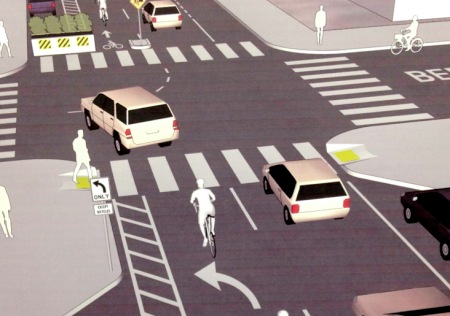
In addition to the lane reconfiguration, the project will come with new curb extensions, marked crosswalks, several rapid flash beacons, and most likely at least one new traffic signal. I’ll have more details when I return to Portland. If people who attended the meeting can chime in with comments that’d be great.
Before I get back to Summit coverage, I want to leave you with some Twitter quotes from Bozzone that capture the mood during today’s meeting:
A good portion of SAC members came to the process very skeptical. To have near unanimity on a choice is a reflection of a meaningful process
Pastor Hennessee: “This isn’t about who drives or who bikes, this process is all about thinking about everyone’s needs..”
As fellow SAC member Noni said today, “Just think about all the great new relationships that have come out of the last year.”
The jubilation and camaraderie! hugs all around, group photos, in honor of Ellen’s retirement there was cake, funky hats
*PBOT Project Manager Ellen Vanderslice, known for her fashionable hats, is retiring at the end of this month.
13 months of public process and very intense debate among the SAC. This is a design that truly incorporates all of the input. I’m proud!



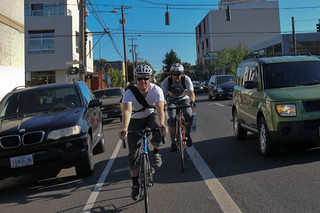
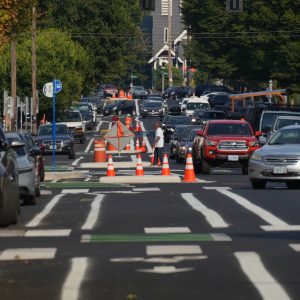
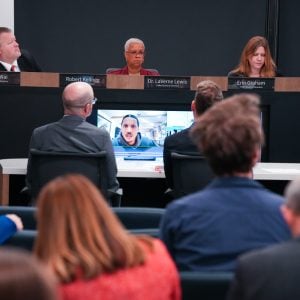
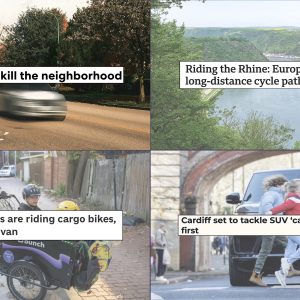
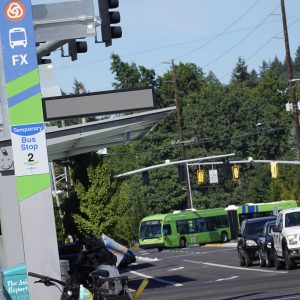
Thanks for reading.
BikePortland has served this community with independent community journalism since 2005. We rely on subscriptions from readers like you to survive. Your financial support is vital in keeping this valuable resource alive and well.
Please subscribe today to strengthen and expand our work.
Thanks, Jonathan, for sharing more news than I’ve found via Twitter. Can anyone clarify this: “a parking-separated cycle track — which was proposed by PBOT as the best solution — wasn’t what everyone felt comfortable with.”
Were people uncomfortable because it was separated by parking? Or because it didn’t allow for an extra lane of traffic in heavier areas?
I think this is pretty good news, but I’m really worried about a few things:
-Cars crossing over the bike lane for parking
-Cars not recognizing the buffer and going into the bike lane in bike-only segments — or will the buffer be an actual physical bumper? I’m guessing no since that would prevent access to parking.
-The shared areas might be awkward.
But I’m attempting to be cautiously optimistic. I’m especially glad that this should reduce issues with bikes and buses.
among other things, the left side cycletrack would have required motorists entering from the west to pull across the track in order to see past the line of parked cars. also, the occasional reverse copenhagen right turn box might have overflowed into the cycletrack itself.
also with the curb extensions bikes would be weaving in and out of the curb lane…
I’m curious if the solution proposed exists anywhere else already?
Think of the buffered lanes on SW Stark and Oak downtown. This will be similar.
Oy. Not an encouraging comparison. Cars constantly encroach in the bike lanes on Stark and Oak, mostly because the bike lanes are the same width as the car lanes and “feel” like they could be for cars.
A version of this left turn shared treatment exists in New York City on their cycletracks…but for shorter distances. Essentially the bike lane merges with the left auto turn lane for about 100 feet prior to the intersection, and all transit is on the right. I don’t know how to embed links, but if you Google the intersection of 1st Ave and E 9th St in Manhattan it will give you an idea, except that road is huge compared to Williams. Having ridden it, it takes a little getting used to having cars merge with you in the the bike lane, but it does work. I am in favor of any option on Williams that removes the bus/bike conflicts on the right side of the road.
This looks like a good compromise. Things will be hairy while people sort out how to share that left lane, but it’s a big improvement on the current situation. And no bus leapfrog!
What about car leap frogging into the left lane? When the bus takes up any of the right lane, cars will go around the bus into the left cycle lane.
Great–sounds nice and safe—cars allowed in bike lane, cars moving over to get into parking spots and once again, bikers not safe. (especially w/ all the Washington drivers making their way north to avoid the freeway) Well, I guess this is one biker family that won’t be taking their kids this way anymore.
if you are taking your kids on williams in its present condition, there is not much that can make it worse
Call me a pessimist but this “solution” looks equally if not more dangerous than what is already there. Even from the perspective of drivers, I’d imagine that it is going to be interesting trying to use the so-called passing lane between Fremont and Skidmore, which is likely to be chock full of bicyclists during peak congestion time. Not to mention the turn lanes. And people trying to get in and out of the parking lane on the far left. Wow.
Far from platinum IMO.
Still, I’ll wait and see what it looks and feels like.
And when it proves to be actually worse in practice, how many years and how many accidents before it is fixed? And will drivers from states other than Oregon even understand this?
Wasn’t bike capacity a primary motivator behind the changes? From a bike perspective, this seems like an improvement as far as design and safety but it seems like capacity will still be a concern.
The “shared environment” in Segment 4 is a downgrade from the existing bike lane. Yes, it moves bikes out of the door zone but puts them in with motor vehicle traffic.
If there is so much motor vehicle traffic in Segment 4 that two motor vehicle lanes must be maintained, then how is it safe to make bicyclists ride in that traffic? A chain is only as strong as its weakest link – Williams will now be a bikeway only for the strong and daring. Would you ride there with your kids?
A left-side standard bike lane would be better than this mixing of modes.
By the way, I am a member of the Strong and Daring and I ride Williams every day. I don’t see how this Segment 4 compromise benefits anybody.
the second, shared lane is not a through lane for motorists. it ends in a force left at each intersection. yes, there will be some amount of crossing for motorists moving in and out of left side parking spaces, but a cyclist in the left lane will not be sharing the space with anyone moving more than about ten or fifteen mph.
Your point about the forced-left diverters at each intersection is a good one. I think a lot of commenters are not understanding that. But all of us know what it feels like when a motorist wants to drive where you are riding. It’s stressful and it’s a hurdle to more people bicycling. This facility will be fine for fast, hardened cyclists but I’m not convinced it will work for the cyclists who need it most. Granted, we have not seen detailed drawings and most of us were not present for the discussions. But what leads you to believe that motor vehicle speeds will be limited to 10-15 mph? I can believe that at peak traffic times, the shared lane will be essentially full of bikes. But what about the rest of the time, when automobile speeds on Williams are much higher and there are few – if any – other cyclists to dominate that shared environment?
I hope the plans call for extensive signage and striping to make it unambiguous that motor vehicles must yield to bicycles.
block lengths through there are only a few hundred feet. if you are a motorist entering the block in the right lane (the only lane available), and you want to move into the left lane in order to pass, i dunno, a bus or something, you will encounter a travel lane that is only nine feet wide, has at least the occasional cyclist in it, who has entered through a gap on the left, the occasional car entering or leaving a parking space on the left, and a force left turn at the end of each and every block. i don’t think you will be able to get up much speed under those conditions.
Right. More likely that the autos will actually slow down the stronger riders in that lane that would otherwise be cruising though and the cars have to slow down to make their left and possibly wait for pedestrians crossing in the same direction as Williams.
if we are trying to make the environment safer for pedestrians, maybe the bikes will need to slow down, yes. the comment elsewhere on this thread about bikes yielding to peds was clever, but there is a real problem, especially at failing.
almost nothing could be a downgrade from the existing conditions in segment four. i already treat this as a shared lane.
I will continue to avoid this stretch regardless of this decision, opting for alternative routes, that take longer and are quieter, in order to avoid the endless, aggravating confrontations of Williams.
Will north bound traffic also have to PEDS FOR STOP?
Law the it’s.
Strong with the Force, you are. Stop for peds, you must. HmmmmMMMmm!
“Will north bound traffic also have to PEDS FOR STOP?”
Mean you what?
Segment 4 is going to become a de-facto “1 car lane, 1 bike lane” road during rush hour. During busy hours when there are so many bikes automobile traffic will find that left lane pretty much useless.
It’s going to be interesting to see how everyone figures out how motorized traffic can merge into the left lane to make turns. Watch out for those blind spots, folks!
I’m glad the process is over.
exactly. the volume of cyclists will “train” the bull to avoid that lane.
It was truly amazing to see this diverse committee come together around this proposal. The left-side cycle track was unpopular for a number of reasons, including the difficulty for businesses on the west side of the street loading and unloading. Some bicyclists opposed it because of the complications in making a right turn, and the danger from left-turning cars.
The shared lanes will each be a block long or less, and there will be diverters at the end of the block to keep vehicles from continuing through. The committee is also likely to recommend a reduction in the speed limit. They talked about 20 MPH, but even 25 would be a huge improvement.
With a single vehicle lane (mostly) and lower speeds, I believe that the Vancouver commuters will go somewhere else. I’m looking forward to a wide, buffered bike lane, no fear of being doored, and no more dances with buses. The glass is well more than half full. The SAC is to be congratulated and appreciated for a huge amount of work and for struggling through their differences to a solution that will improve the safety of the street.
I love the optimism and totally agree with this assessment. Major improvement, thanks to everyone who made this happen.
Here’s hoping!
I’m super glad that the “wisdom” of the crowds and “democracy” can once again provide a completely stupid solution that ensures people will die. I’m trying to keep my composure and not go off the deep end, but I really think the car advocates should be held accountable WHEN cyclists and pedestrians die on this street (I give it 6 months before someone is killed). I was struck by the absurdity of this whole thing riding down Vancouver a while back and realizing it’s throttled down to one lane. So, it seems southbound is fine to be one lane, but north-bound be damned.
I get the feeeling of being disenfranchised and the frustration over being ignored by what is supposed to be your government, but this is an f’ing circus and a ridiculous issues to draw a line in the sand over. Congratulations to the neighborhood, the good citizens of Vancouver WA solute you for keeping your neighborhood a highway!
how on earth is taking williams down to one lane through most of its length, and keeping a second lane that can only function as a left turn lane or as an overflow lane for half a block at a time “keeping it a highway”?
Hey Are. Call me, I have a 6-lane bridge over the Columbia rive I’d like to sell you!
I think the shared section is a carrot to motorists to help get this thing approved, and it will be somewhat easy to convert later when a) it is demonstrated to be dangerous and b) the shared lane is not even necessary because it is only needed (for motorists) during rush hour, but the lane will be full of bikes at that time anyway, so few cars will be able to use it.
What happens when some yahoo car driver decides that the shared lane makes a nice passing lane?
They run into a concrete diverter?
That is the problem. Cars unfamiliar with the area will continually see traffic on the right, bikes on the left, and realize they could get in left lane to go “faster.” This will result in them eventually wanting to merge back to the right. They can do this before the intersection, blocking a lane of traffic and annoying motorists on the right, or they can do this AT the intersection, which is extremely unsafe.
Forcing one lane to turn left at random intersections for such a high-traffic street seems poorly thought out.
Wait, you’re kidding me… so now, there is going to be one huge FIVE BLOCK section of Williams with NO BIKELANE WHATSOEVER??????
Great. So my six year old is now supposed to ride her bike in 35mph traffic, because PBOT eradicated the entire bike lane there? How is this possibly a step forward? Replacing a bikelane with a sharrow?
Or have I just misread this very confusing post? Is somebody able to clarify?
i challenge anyone go take it up to 35 mph in a nine foot lane that ends every couple hundred feet in a forced left. is your six year old riding williams now? do you actually expect any outcome on a street that carries ten thousand cars a day that will create an environment for six year olds? if PBoT turned this into a closed course that a six year old could manage, would three thousand bicycle commuters still be able to use it?
I definitely didn’t mean to sound snarky. It’s just that this article did not make it at all clear that there would be some sort of new barriers installed this shared roadway section. It just said, we would lose a bikelane, and gain some sharrows.
You can’t blame anybody for having a mini-freakout at the prospect of losing, rather than gaining, a cherished bike lane their family uses daily. My two cents.
I don’t think you understand the plan as it is presented. End-of-block diverters are key. This is a huge improvement upon existing conditions. I wish 6 year olds were more accommodated, but this is a very constrained area. A win for everyone 7 years and older works for me.
I guess this move towards more vehicular-based cycling in this project just makes me nervous. We really should be striving for better separated facilities – like they do in places like Europe.
I know most of the people who read BikePortland are seasoned, veteran cyclists who are confident.
But it’s important to remember many people out there on bikes are NOT confident riders. They are scared shitless. The reason they are able to ride their bikes for their commutes is that from downtown Broadway ALL THE WAY to Killingsworth, they are able to ride their bikes without ONCE – check it – ONCE, leaving a bikelane. Ever.
That is amazing. I don’t know how comfortable some of these people are going to be when they are going to start sharing a travel lane on Williams with crazy, distracted commuters in motor vehicles.
The city needs to accommodate both types of cyclists, novice and experienced, on all public streets, both local and arterial.
Anything else does not deserve Platinum status.
And we are long overdue for a much more proactive motorist education campaign.
Anyway, based on cyclist volumes alone, the shared lane will effectively become a full-lane bike lane.
I agree that vehicular cycling is very intimidating for some folks new to cycling, but I can’t believe those folks are already super comfortable on Williams as it is now. I suspect these are folks cruising up and down Rodney.
I am also surprised people are saying they regularly bike with their kids on Williams now. I haven’t seen a lot of kids out there. I know some older kids are there, and people have trailers, but little kids on Williams on their own bikes? I’d send my kid to the sidewalk.
THIS. i agree that not having to leave the bike lane made me MUCH more comfortable when first riding in that area.
my experience has been the opposite. i will self-nominate as vehicular. through most of “segment four,” cook to skidmore, i do not use the bike lane at all. it is too narrow and too close to parked cars, and the adjacent travel lane is only about ten feet wide, which means an overtaking motorist will almost inevitably pass too close. instead, i assert the lane, about a foot to the left of the bike lane stripe, and force overtaking motorists to move over.
my own preference would have been to remove the bike lane through segment four and replace it with sharrows in the right travel lane, but i can only imagine the outrage on these boards if the SAC had adopted that idea. i am not wild about a left side treatment, but at least we have achieved something slightly resembling taking this down to one lane.
Unless I’m mistaken, cars already can park on the right side of Williams and have to cross over the bike lane to park. In fact, that was the holdup at Fremont (beginning of section 4) when I rode home this afternoon.
So…the first time a bicyclist is hit by a car cutting across that new “shared” left lane, perhaps we can call it a “Vanderslice…”
I honestly think this is fail. Yes we get a wider bike lane and some buffering from cars, but as Stripes points out, we now have a big gap with no bike lane at all. This seems worse than what we have now. Also it is no longer consistent for the full stretch of the road, thus creating more room for confusion.
A slow bike will now be followed by a slow car. How will I get around a slow car? Take 12th street? 21st?
And, why is this road dangerous now? I do not understand this. Is it just the speed limit? I suppose that is easy to fix.
I do not understand how this is more dangerous than the broadway bridge. Or broadway itself. In fact, I am having a hard time thinking of a high volume street that is safer.
Also, who will be responsible for moving the Mario?
Well I suppose like all the rest of us who ride in multi-speed traffic, you slow down too, until it is safe to pass to “get around” the traffic that is in front of you…you know, with the right of way.
Or take the right hand lane, like most of us do the left now, after signaling, to pass safely.
I will miss the mario kart art too.
Ohhh man… This ‘plan’ (if I dare grace it with so practical a term) is pure idiocy in action if I’ve ever seen it. It is DEEPLY flawed.
Let’s see…. how many times will cyclist have to cross lanes full of stressed-out rush hour drivers? Hmmm…. Let’s see how many cyclists per year we can kill that way- before we even begin to make them ride in front of those very same drivers, who will, in frustration at their slowness, in confusion over their own situational role, then attempt… to pass them? … While dealing with other drivers avoiding and passing buses in the ‘non-mixed’ lane?
… Riiiiiight. Sure.
This plan seems far more like an actualization of somebody’s ‘DeathRace 2000’ fantasy than any attempt to improve traffic safety. In what way is ANY of it acceptable? I suggest we start stocking up now on white bikes for all the future memorials.
I ride North Williams/ Vancouver at least twice a week and I agree with ‘Seth r’ in that I’ve never found this street to be anymore dangerous than Broadway or the Broadway bridge access. Any plans for North Williams should first consider further reducing overall confusion rather than adding to it.
Should be interesting, one of the things that I the comments so far is that no one really knows what this will be like, so unlike the other options there are not a lot of opinions compared to some of the previous stories.
I for one am glad the process is over and I’m not even on the Advisory Committee!
If a left turn lane for vehicles is important, why not use the parking lane for that? Especially right at the intersection itself.
Seems like theres enough space to have
Sidewalk – Left turn lane – 4/5ft straight bike lane – car lane
Under the current scenario, left turning cars stopped for pedestrians in the crosswalk will block all bike traffic.
Like all changes it will take time for people to get used to it. As both a cyclist and a driving instructor in the UK. I see many different solutions around the country to dealing with cyclists. I’m not sure if I have ever come across a solution that is ideal. The best solution I saw was in Spain were the cycle path was completely seperate from the pedestrians and cars, seperated by having it’s own kerb on either side. However there is still problems when you approach junctions.
I wonder if the 2′ buffer will also be marked like the 3′ buffer. That would make the bike lane really stand out.
unfortunately, that does not appear to be the NACTO standard, which PBoT has supposedly adopted
http://nacto.org/wp-content/uploads/2010/08/Buffered-Bike-Lane_Annotation1.jpg
Should be interesting to see how this works out. Will commute traffic move to MLK or I5? How many left hooks before things settle down?
I at least have some confidence that the changes should make it easier/safer for pedestrians to cross Williams. Pedestrian safety seems to be overlooked by most media coverage of this project. Instead, it’s mostly about bikes and cars.
I think we should probably send our officials on more “fact finding” missions to bicycle friendly European countries. That way they can learn about even more common sense solutions which they can refuse to implement back home.
I think it will be very interesting to see how this works. A lot of people commenting are complaining because the solution does not fix one or another of the many problems identified with the road. Yes, it’s true, it doesn’t fix every single problem with Williams. I’m not sure any of the possible solutions would have. Each one entails some compromises. This one removes the bus-bike leapfrog, massively improves bike space in all segments except 4 (allowing more comfort, easier/safer bike-bike passing and less dooring risk), will add signals, slow speeds, and address crossing safety, and sets segment 4 up with the potential to be totally converted later, while addressing concerns many people had (from PBOT to the neighborhood residents) with capacity in segment 4 in current conditions. I am bummed that the capacity concerns overtook the safety benefit of a continuous bike-only lane, but this project is not about me getting everything I want, it’s about a solution the community can buy into, and I am impressed by the SAC hanging in there through all the tough discussion and getting a high level of consensus on choosing an option.
I find the apparent level of concern about left-hooks a bit surprising. Right-hooks are a current problem in every bike lane in Portland. Yes, getting drivers used to looking left is different, but left-side bike lanes exist in at least two other places (14th and 5th Aves) and I haven’t had any more problems with those than I have with other bike lanes. And in segment 4, drivers will be expected to mix before turning, which should reduce the risk there, and the heavy right turn volumes at Fremont will no longer be an issue, so it doesn’t seem like it creates any concerns that didn’t already exist.
One interesting effect of the change, which I hope PBOT will attend to in the transition, is that currently, people turning left onto Williams can turn even when there is bike traffic, as they are not turning into or across the bike lane. That won’t be possible any more, so cross traffic will have to pay greater attention to bikes.
10 points for the most level-headed comment in this thread
I think that after this is in place for awhile, people who are using Williams as a way around traffic on I-5 will find other routes and the capacity concerns will diminish and we can convert the shared portion to a dedicated bike lane.
My initial design thoughts…one problem I can see for thru cyclists is how to deal with last second driver movements or delay near intersections.
With the shared left turn lane and bike thru lane – has there been any discussion on minimizing the last second lane changes by drivers moving from the thru lane to the left lane? Is there a proposal to add 40′ or 50′ of solid rubber low barriers (as used in France etc) or other MUTCD approved device?
And when left turning drivers (2 or 3 cars) stop for peds crossing (north south) in crosswalks, will there be enough room for thru cyclists to continue straight without having to merge into the faster auto thru lane?
For starters I could not be happier that no Cycle track (separated bikeway) is going in here.
That would have been horrible.
A word on the shared lane, as I have been hit in them.
A shared lane here will only encourage the bad driving habits happening here to continue, only in a smaller stretch, so surely more frenzied.
THis street should be one traffic lane, one wide bike lane the whole way….
Nothing more, nothing less.
I will reiterate.
Someone on a bike is going to get smashed from behind in this shared lane, as a drivers impatience wins over common sense.
This is crazy and ridiculous. Whe I saw this design previously I thought that there was no way that it would be taken seriously. This will be less safe for inexperienced cyclists or children and inexperienced motorists. I can think of many ways that cars and cyclists will have negative interactions in this set up. I ride this route almost daily. This sucks and is a design failure. What kind of insular thinking led to this? Cars will be continuously cutting in and out of this “shared” lane ignoring the sharrows that have no cosistent meaning in the city. This is a huge step backward! I am bummed.
Victory in that they’re taking away a car lane for most of the section.
The left-side lane will have much smoother flow, especially in the bus-heavy Russell – Fremont section.
The “shared lane” through the Boise business district will be dicey. But, I imagine that at peak hour when there’s tons of bikes, the cars may stay out of it.
My questions:
* Overtaking — will the city provide guidance for safe overtaking in the buffered bike lane? It needs to. Should slower traffic keep to the right, as is the convention, or to the left?
* Wider space requirements needed — bicyclists shoulder-checking over their right shoulder “wobble” more than left-shoulder checkers. This is because it’s not a familiar movement, and takes more time to twist and comprehend. I’d like to see the left-side lane a foot wider than an equivalent right-side lane.
Overall, aside from the obvious problems of being stuck in car traffic from Cook to Skidmore, and a lack of pavement markings to designate safe overtaking breadth and positioning, I see this as being a pretty good solution.
Ted Buehler
Now, let’s do the same thing to NE Alberta.
alberta is a two-way street. with all the pedestrian traffic, auto speeds are already rather slow. i would instead say, let’s make williams more like alberta.
Yes, and I think Alberta would be better with one way auto traffic, and a two-way cycle track curbside, parking-buffered. I’m not suggesting it to calm auto traffic (as on Williams), but to create a bona-fide bike/ped district.
a ‘bona fide’ bike/ped district wouldn’t have any motor vehicles at all.
Yes, in time :^)
alberta carries a fair amount of east-west traffic. diversion would be to prescott and/or killingsworth. each of these is already carrying four or five thousand cars a day. i am not saying never, but let’s think this through.
Indeed. But anyone with a brain or at least a healthy sense of self-preservation rides on Going anyway. Going makes riding on Alberta more-or-less unnecessary.
Sure, Going’s the better option for getting from A to B across N/NE Portland–but that’s not what I’m talking about.
It’s not that a bikeway is needed on Alberta, it’s that Alberta is ripe for conversion to a bike/ped district. Alberta isn’t only a place at which people arrive, it’s a tourist strip and an entertainment zone where people linger and roam.
And brains or no brains, people are riding on Alberta… and walking… and crossing back and forth.
Ah! I understand what you’re saying. I’ve just been looking at it from the other way around, that is, from the intention of trying to preserve it as multi-vehicular corridor.
Yeah- a bike/ped. zone would be pretty nifty (not likely in the short term, but nifty); they have a really nice one in New York, downtown by city hall.
True, although Prescott is almost never congested. And I suspect that with some signal time tweaks on Killingsworth, the signal back-ups there could be alleviated too. I agree it makes sense to see all three streets as part of one system, along with 33rd and 15th.
The de-facto use on Alberta is already trying so hard to *be* a bike/ped retail district, and the stead stream of cars already seems so out of place there with the amount of ped crossings, sidewalk use, and bike traffic. It feels to me like it’s begging to happen eventually.
so where are the motorists going to go, into the neighborhood on the bike boulevards?
Not likely if they’re interested in moving along smoothly (stop signs, speed bumps on n’hood streets, and turn restriction ala SE 39th & Clinton), and not if flow on the other arterials is engineered well. It seems reasonable to anticipate that in a short time drivers will learn to use Killingsworth and Prescott instead.
I can see Alberta being 1-way eastbound, to facilitate traffic exiting I-5 and heading into the Alberta district, starting at around 8th/9th/10th. Westbound traffic would shift to Prescott an Killingsworth.
Sorry, I keep neglecting to use the “Reply” function.
Couple of things.
N Vancouver currently has a bike lane like the proposal – with parked cars on the curb-side. No real change there.
Left-side: avoids the dreaded bus-bike leapfrogging. I don’t know about you gents, but car dooring and bus/truck ‘meat-grinding’ are my biggest 2 fears cycling (vehicular cyclist here who has traveled to Amsterdam).
Shared lane: see NW 18th ave & NE/SE 28th ave. Although lower traffic, does the job with mixed-traffic. Very few accidents, forces cars to drive at slower speeds.
Need: enforcement. PPB needs to park those speed-ticket vans along the street and send some automated tickets to speeders.
It sounds like there is a large segment of commenters above who were hoping for a ‘bicycle freeway,’ with timed green lights for cyclists and barriers for cars turning across the bike lane. Unfortunately, that isn’t really practical in a business destination corridor. I think one of the biggest reasons folks race uphill along this street is because they feel very unsafe being pinned in the dooring zone in a puny width bikelane. Having more space – I would hope – will help to slow things down a bit. You know, enjoy the scenery, if you will. Sure, its nice to get somewhere fast, but its also nice to get there in one piece.
And I’m sure I’ll get a lot of hatemail for that last comment.
tens of thousands of cyclists die each year in terrible high-speed bike crashes. fast cyclists are a menace to society and the children!
Despite how I may have come across before, I am in favor of slowing things down.
As long as the signals are re-timed so that cyclists don’t have to stop at every….single…..solitary….stoplight.
I ride 4th Avenue northbound, I understand riding slow to coincide with green lights.
As a driver, I’d be freaked out trying to cross a very busy bike lane and parallel parking on the left side of the road. This seems crazy! The only reason Oak and Stark work at all is because bike traffic is so low. I’ll bring a bag of popcorn and watch people yelling at each other once this solution gets implemented.
Am I the only one who views is a a colossal cluster just waiting to happen? Buffered lane, yes, but lets put it on the right side as 99.9999999% of the people are used to seeing! Forgive me if I view this as yet another epic fail on the part of PDX. I find it hard to believe that this is going to be a better solution for cyclists OR motorists.
Hardly. There are plenty of us posting here that think this ‘solution’ is a**.
That said, even if a 99% majority of us don’t want it, it WILL happen anyway: PHARAOH HAS SPOKEN! The issue is CLOSED: and you will love it… you WILL LOVE it.
(Now get back in yer hole- all committee decisions must appear unanimous… )
there was a lot of public process around this.
as a member of the “strong/fearless” group, i’ve been of the mind that this corridor didn’t need help
after looking at this post, i’m intrigued by this proposed solution for the reason that it will make williams a more “urban” corridor – more like central city, and less like an arterial
as it is my daily commute, i’m sort of annoyed as i expect to go slower than i do
but
i’m intrigued to watch what this does to the neighborhood. i’m guessing it will promote business and residential density by creating a slower zone.
or, put another way, it will reinforce the urbanization that’s already loosely in process (condos, small business strip, new seasons)
Wow. It’s as if they want to discourage biking all together.
This is truly going to be epic.
a “vehicular cyclist” should not have to worry much about dooring or meatgrinding. unless you are using the phrase in some unfamiliar sense.